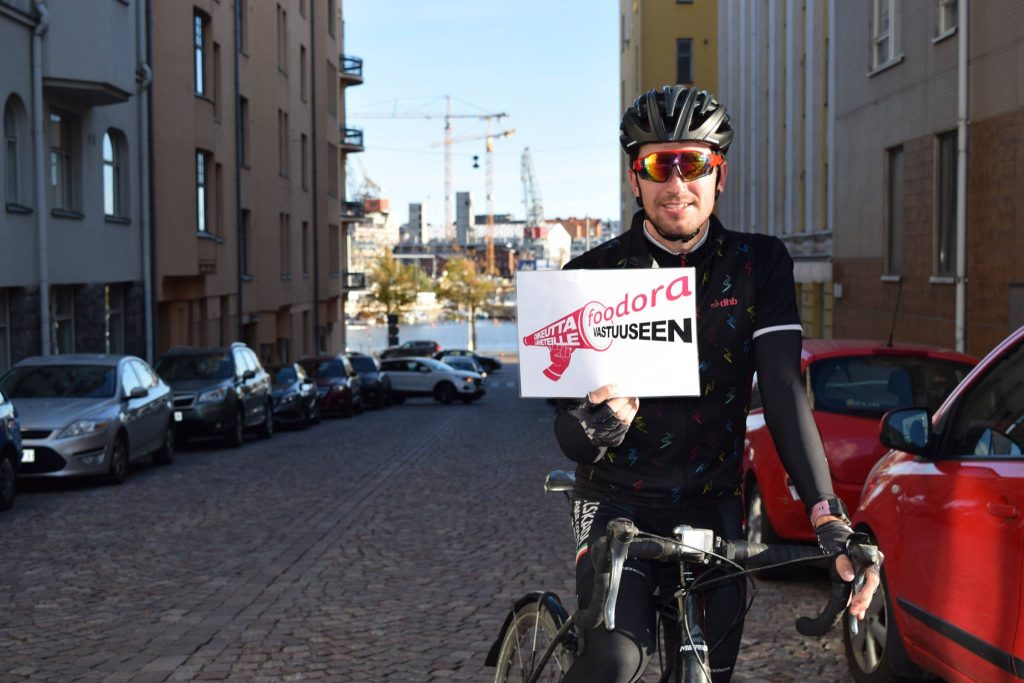My name is Ibai and I worked for Foodora Finland for almost two years. My relationship with Foodora began as a Rider on late-2016 with a freelance-based agreement and in mid-2017 I became a Rider Captain with an employment contract up until I switched to another job at the end of last month.
I want to start by expressing that I have a bittersweet taste towards the ongoing Foodora campaign. On one hand, it hurts me deep to realize how a company to which I am grateful and to which I only wish the best must be taking a hit with the campaign. After all, It provided me a way to make a living by biking around, which is something I really like, and I made a few good Friends in the journey, many of which are still working in Foodora. On the other hand, I am very happy because the deteriorating working conditions of “false freelance” messengers are finally becoming a matter of public concern that will need to be addressed.
Even though the working conditions of the freelance messengers have never been pink at the pink company, their progressive deterioration has been more than evident over the past years. Moreover, the recent payment model restructuration has decreased the salaries of the freelancers, leaving especially the car drivers on a precarious situation that goes beyond the limit of what is morally acceptable.
Foodora Finland started running some couple of years before my involvement on the company. It all started as a locally managed start up with a Finnish CEO. All the messengers, which were named as Riders, had permanent employment contracts. These messengers enjoyed the working benefits bound by any employment contract, such as occupational insurance and health care, holiday- and sick leave-pay or double Sunday pay, as well as many other profession specific benefits such as km allowance, parking benefits, Rider Space with a Bike Maintenance Hub and Equipment Storage Facilities (including bikes, personal items an company equipment), bike and phone maintenance fees or a compensation model for other work specific equipment such as gloves, lights or winter tires.
Foodora Finland was really pink back then, but it was not without fault: the blackhole of this business model was that the remuneration model of Riders was poorly designed. The Riders were exclusively paid on an hourly pay basis, without a delivery bonus that would incentive them to do the orders. This led to an uncommitted workforce that was unwilling to embrace the increasing amount of hourly orders of a company in expansion. The Finnish direction was therefore forced to change to a remuneration model that would incentive new messengers to do orders, and they chose a formula that combined an hourly rate with a delivery bonus. However, instead of changing the remuneration model only, they also chose to make another change; to switch from a regular employment contract to a freelance-based agreement.
Therefore, a company that once started exclusively with employed messengers switched to offer freelance-based agreements to all the newcomers. This was a major move that can only be interpreted as the beginning of the end, since it opened the gate for further deteriorating working conditions on the unregulated far west market of employment relationships that are flag shipped by these false freelance agreements. This game-changing move was executed during times when Foodora Finland was starting to transition from a locally managed “cool&pink” startup to becoming part of a multinational corporation. Nevertheless, the Finnish management on an attempt of being loyal to their original code of offering a fair workforce, committed to maintain many past benefits such as the Rider Space with its Bike Maintenance Hub and Equipment Storage Facilities.
Once the they got rid of the Finnish CEO the integration of Foodora Finland into the multinational corporation was complete. Decisions were no longer taken in the Headquarters of Helsinki, but Foodora Nordics personnel in Stockholm, who at the same time respond to orders coming from Berlin. At this point the deterioration of the working conditions really started to pick up. The employment contracts off all the Dispatchers in Finland were terminated first, outsourcing this workforce to Berlin. Later on, the few employee messengers of the company (Riders with original contract and Rider Captains) were forbidden to work on Sundays, a change that effectively meant a pay cut.
They also started to gradually dismantle the Rider Space: they took away the Equipment Storage facilities first to later on remove the Rider Space with its Bike Maintenance Facilities, leaving the messengers without shelter on winter. Somewhere along the way they also deteriorated their shift allocation system by setting a maximum of 25h/week limit, introducing the Batch System, or making it more difficult to cancel or swap shifts. The flexibility that they always promised that the freelancers were legally entitled to was now severely compromised. They also changed their language to reflect that their messengers were no longer employees but “business partners”, starting to refer them as Delivery Partners instead of Riders.
Nevertheless, the most severe and scariest cut to messengers’ working conditions is the last one. The freelance Delivery Partners were forced to sign a new agreement if they wanted to be able to take shifts in the future and the only thing that was changed of the previous agreement was the compensation model. Sadly, the compensation model was changed downwards.
Bike riders were to get 20 cents more for every completed order, but their new hourly pay was one euro less for Monday to Saturday and a further one euro less on Sundays. Considering that the average order per hour in Finland is less than 2.5 orders/h, the math is pretty straightforward: Delivery Partners now get 0.5€ less on Monday to Saturday and 1.5€ less on Sundays. In what car drivers refer, their pay-cut has even been bigger. Even if their delivery bonus also increased by 20 cents and hourly pay was only decreased by one euro on Sundays, they removed the KM allowance and the parking benefits, which have a huge negative impact in their monthly income.
The scariest part of it all is that there is nothing stopping Foodora to further deteriorate the working conditions of their freelance workforce. Tomorrow they could force their Delivery Partners to sign a new pay cutting agreement since there is nothing stopping them. Many of their freelancers are desperate to work at any cost since they perceive to have little chance to better employment elsewhere. Moreover, Foodora management seems to have little to no remorse every time they deteriorate the working conditions of their freelancers; they seem to have no humanity or empathy whatsoever but tons of indifference to “compensate”. Most importantly though, there is no collective agreement for this profession, neither there seems to be a jurisdiction stopping Foodora from offering freelance agreements to a workforce that on practice operates under conventional employment conditions and not as independent contractors as they claim.
I want to finish by expressing that I wish and hope that the problem of deteriorating working conditions in Foodora will be addressed. I also want to show my willingness to help to try and find a solution as an independent agent that could play as an intermediary to help build bridges between the campaign members and the company management. Finally, I want the society and the decision makers to realize that that this is a problem that goes well beyond the pink company, a matter of legal deregulation that, if not addressed, companies will keep taking advantage since they are born to make money after all.

